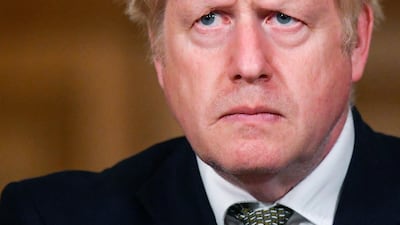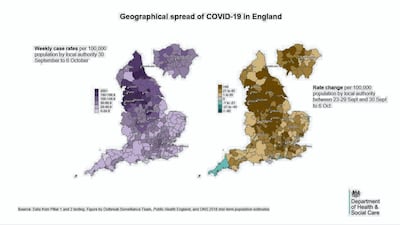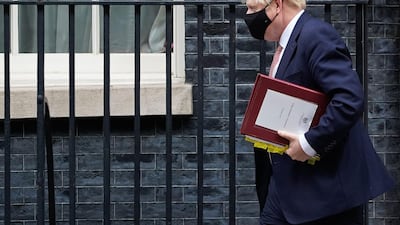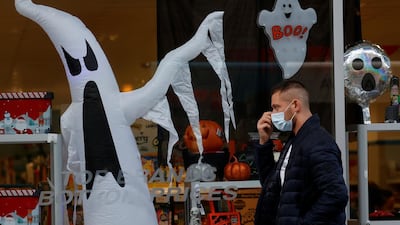British Prime Minister Boris Johnson detailed his country's new three-tier Covid-19 lockdown system in an address to the nation on Monday.
But the government's most senior scientist warned that the tough new measures may not be enough to curb the spread of the coronavirus.
Mr Johnson earlier said the UK would suffer an “intolerable death toll” and the NHS would “fall over” if he simply let the virus “rip”.
He said the country would be divided according to areas of medium, high and very high infection levels.
Liverpool is the first city to fall under the high alert classification and its pubs, bars and gyms will close in days.
The city recorded 600 cases for every 100,000 people in the week to October 6. The average for English towns and cities was 74.
Nottinghamshire, East and West Cheshire and a small area of High Peak, Derbyshire, will also move to a high level alert, Mr Johnson said.
"No one wants to impose these kinds of restrictions, especially me, these erosions of our personal liberty," he told the nation.
"But I’m as convinced as I’ve ever been that the British people have the resolve to beat this virus and together we will do just that."
Mr Johnson continued to distance himself from a national lockdown, similar to that of March and April.
He said many people would think it would be an "extreme" option and it would cause society and the economy harm.
"I really hope with the package of measures we’ve got, if properly implemented and enforced, we can get the infection rate down," Mr Johnson said.
He was joined at Monday's briefing by Chancellor Rishi Sunak and chief medical officer Prof Chris Whitty.
But Prof Whitty was more apprehensive about the new strategy.
He said that even the toughest curbs would probably not contain the spread of the virus in the worst-hit areas, and that local authorities would need to add more restrictions.
“The base will not be sufficient," Prof Whitty said. "I think that’s very clearly the professional view."
Mr Sunak spoke more of his "winter economy plan", to pay two thirds of workers' salaries in the Job Support Scheme, which will begin as soon as the furlough scheme expires at the end of this month. The scheme will run for six months.
Mr Sunak said the UK was making its welfare systems "more generous and more responsive" to help those in need during the pandemic.
He said last week that cash grants for businesses required to close would be increased to up to £3,000 ($3,919) a month.
On Monday, Mr Sunak said that he would extend this to Scotland, Northern Ireland and Wales if their devolved governments were to implement similar measures.
The UK recorded 13,972 more cases and 50 deaths from Covid-19 on Monday, 15 fewer fatalities than the day before.
Very high alert
Under very high alert, additional measures would be agreed on with local authorities but would probably include a ban on mixing between households in all environments except outdoor public spaces, where a maximum of only six people can gather.
People will also be told to avoid non-essential travel in and out of areas with a very high alert level.
High alert
Most areas under local lockdown will move to high alert, where household mixing will be banned but people can still meet outdoors, as long as it is in groups of six or less.
All pubs and restaurants can stay open.
Medium alert
Medium alert covers most of England with restrictions including the current rule of six and 10pm curfew on pubs and restaurants.
Mr Johnson said the country needed to walk a tightrope between protecting lives and the economy.
Mr Johnson earlier told Parliament that it would be wrong to put the public National Health Service under “unbearable pressure”.
“If we let the virus rip the bleak mathematics say we would suffer an intolerable death toll," he said.
“The virus would spread with such velocity that there would be no way to stop it.”
Mr Johnson pleaded with angry local mayors to “work with us on these necessary but difficult measures", telling them it would be “unforgivable” not to curb the spread of the virus.
He said mayors in cities with high infection rates would be encouraged to approve a high alert level, rather than the government imposing tough measures.
There would be more funding for testing and support for industries such as the closed hospitality sector, Mr Johnson said.
Before his statement, government scientists warned hospital admissions were expected to surge in coming weeks, warning temporary Nightingale hospitals that there would be overflow patients.
Asked for data on the spread of Covid-19 in pubs and restaurants, England’s deputy chief medical officer Prof Jonathan Van-Tam said the virus “thrived” through human contact.
Prof Van-Tam said Japan’s “three Cs” advice indicated that the virus spreads in closed and crowded spaces, and with close contact.
He drew attention to the duration of contact and the volume at which people speak.
“So all of those settings where the three Cs and duration and volume may apply are areas where the virus will thrive and spread, if we allow it to,” Prof Van-Tam said.
Culture Secretary Oliver Dowden said the government wanted the second wave under control by the new year.
"The purpose of these measures is to get the virus under control," Mr Dowden told Sky News.
"The point of moving to this tiered system is that in those most highly affected areas we have measures in place to control the virus."
Labour leader Sir Keir Starmer said he was "deeply sceptical" of the government's strategy but hoped it "brought us back from the brink".
There was anger on Mr Johnson's own side.
Esther McVey, a former Conservative minister, said new restrictions would cause "more pain and damage, destroying livelihoods and creating untold damage and poverty".












